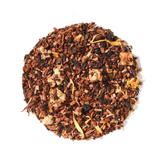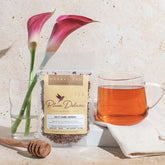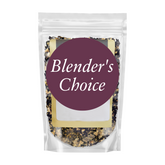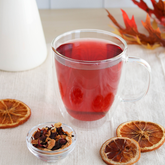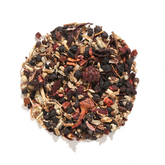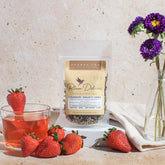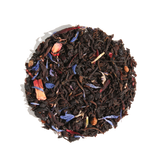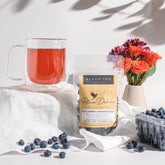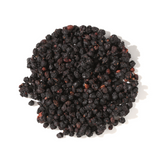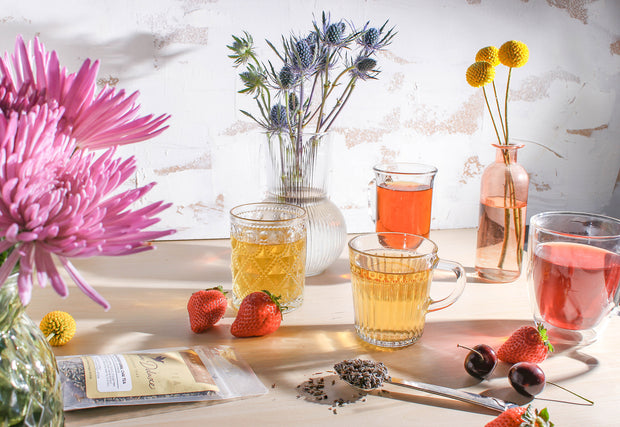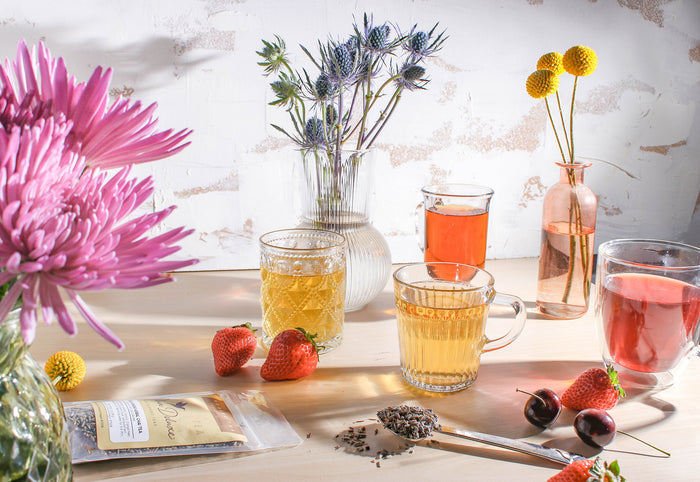Many tea drinkers at least anecdotally know tea is in general good for your health. But many wonder, what tea is good for headaches, specifically? Now, science has confirmed that drinking certain types of tea helps ease the pain from headaches. Here are four different types of headaches and the tea that helps them.
***Disclaimer*** Please note that I am NOT a licensed medical doctor. This information is gleaned from numerous sources and studies, but should not be a substitute for your doctor’s guidance. If you are on any medications, please do your research and ask your doctor about how these teas could interact with your medications. Plum Deluxe teas are not meant to treat or cure any illness.
Now onto the good stuff. According to the International Classification of Headache Disorders, there are over 150 different types of headaches. Primary headaches are the ailment in and of themselves, while secondary headaches are a symptom of some other ailment. The following are recognized as some of the most common types of headaches and teas that can help with them.
Caffeine or No Caffeine?
Caffeine can sometimes be the ingredient that helps with a headache, but it can also be the one that makes a headache worse. In fact, some headache medications or protocols actually include caffeine. However, if you are unsure, try one of the caffeine free teas first to see how your body reacts. If you are on medication that is a specifically prescribed dosage, definitely stick with the caffeine free teas as the caffeine may boost the effects of your medication, which could be dangerous.
In a study done in 2001, researchers found that caffeine (such as found in tea) alone was as effective at reducing the pain from headaches as taking Ibuprofen alone in about 58% percent of participants. Combining the two together increased the benefits further with 71% of people reporting relief.
What Tea is Good for Tension Headaches?
A tension headache is a secondary headache as it is often caused and exacerbated by stress, muscle fatigue, eye strain, or other psychological issues. Because of that, teas including chamomile are often used to reduce stress and aid in sleep. It is also often used to help migraine sufferers (see next section for sources). Peppermint oil has also been found to be highly effective in easing tension type headaches.
Plum Deluxe’s Cuddletime Herbal Tea is perfect for tension headache relief as it contains both chamomile and peppermint. Try this tea on its own or in conjunction with de-stressing techniques such as deep breathing and relaxation.
What Tea is Good for Migraine Headaches?
Migraine headaches are often accompanied by numerous other symptoms. A study done in 2014 by the Zanjan University of Medical Sciences found that ginger was as effective as sumatriptan (a common migraine prescription) at easing migraine symptoms within just two hours.Plum Deluxe has numerous ginger teas, but try the Rejuvenation Blend Herbal Tea, which is caffeine free. Ginger is also commonly used to help ease nausea, a common symptom of migraines.
Another herb commonly used to prevent migraines is feverfew. It’s used to combat a large number of ailments, but its efficacy is mixed for migraine sufferers. Some report reduction or complete elimination of migraines, while others report no effect. The bottom line: This is one you should talk to your doctor about before taking as there can be side effects. Also, do NOT use feverfew if you are pregnant as it can induce contractions.
Once again, chamomile is a winner here in terms of migraine relief. In a double blind placebo controlled study, researchers found that “pain, nausea, vomiting, photophobia, and phonophobia significantly decreased” about 30 minutes after using chamomile oil. If you want to get REALLY into the science behind chamomile versus feverfew, this is a good study to read through. Ultimately, they recognized that different parts of each plant had various concentrations of the key chemicals, but concluded that more research was needed.

What Tea is Good for Cluster Headaches?
Intense pain around one eye is what identifies cluster headaches. They come in waves and can seriously derail your day. One natural remedy for these attacks is ginger. While straight or concentrated ginger may act faster, a tea may be more readily accessible or easier to consume. It can also help with the other symptoms surrounding headaches in general.
Try the Coconut Ginger Soother Herbal Tea or any of the other ginger teas available at Plum Deluxe.
What Tea is Good for Sinus Headaches?
A sinus headache is a secondary headache and is characterized by a dull or throbbing pain throughout the sinuses. These are most often the result of a sinus infection, the predominant symptom of which is thick yellow or green nasal discharge. Because of that, any steam on your face will help to loosen the buildup in your sinuses. A ginger tea such as Rejuvenation Blend Herbal Tea will help reduce inflammation, whereas any tea with mint or menthol will help open up those sinuses. Try Refreshing After Dinner Mint herbal tea to really loosen things up and add some relief.

Ingredients and Teas that are Good for Headaches
Ginger — nausea, anti-inflammatory
- Coconut Ginger Soother herbal tea
- Rejuvenation Blend lemon and ginger herbal tea
- Just Ginger herbal tea
Feverfew — Often used in preventing the onset of migraines but should not be taken during pregnancy as it can cause contractions. Science is conflicting, but some studies show it is effective at prevention.
Peppermint — pain relief and stomach upset
- Refreshing After Dinner Mint peppermint and spearmint herbal tea
- White Chocolate Peppermint herbal tea
- Citrus Mint lemon, orange, and mint green tea
Chamomile — relaxation, decrease inflammation
- Calm Chamomile Bloom chamomile and lavender herbal tea
- Cuddletime chamomile and peppermint herbal tea
- Reading Nook rose, lavender, and chamomile black tea
Willow Bark — Willow bark is sometimes called “nature’s aspirin,” meaning this is also a tea good for headaches. It is commonly used for reducing inflammation and fever, but it is very strong. Do not mix with meds or use it with blood thinners or meds for blood sugar disorders.
Whatever kind of headache you have, it’s good to know you have delicious options for relief. Tea provides a natural and calming remedy so you can take charge of that headache and get back to your day.
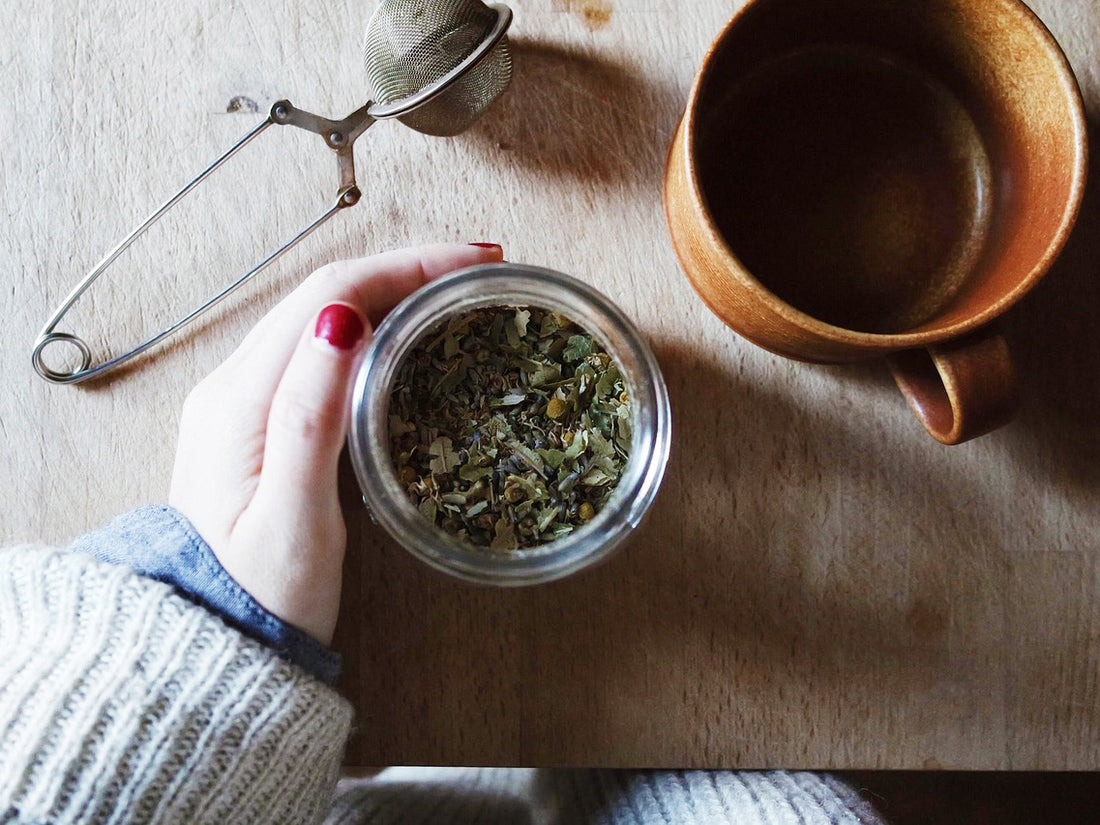
![Spring Break Tea Variety Pack [6-Pack Variety of Flavors]](http://www.plumdeluxe.com/cdn/shop/files/spring-break-pack.jpg?v=1740682266&width=165)

